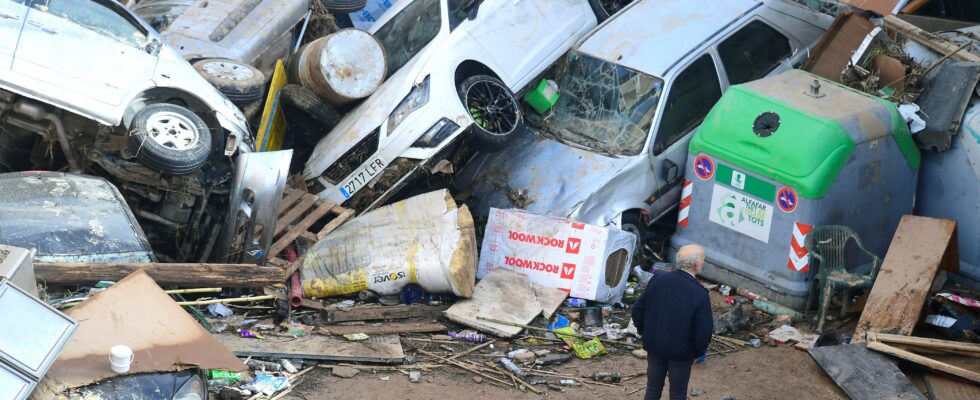After the shock, fear and consternation, after the three days of national mourning, comes the time to analyze the apocalypse that occurred in Spain, on the night of October 29 to 30. The time has come, as in France, Belgium and Germany where cataclysmic weather episodes have also occurred in recent months and years, to face the consequences of pride, greed and vanity. . By themselves, the incredible piles of cars stuck in the villages around Valencia indicate, through a scabrous irony, the main culprit for this tragedy, the abusive consumption of fossil fuels and CO2 emissions in crazy quantities. The “cold drop”, this very high altitude depression which has just killed more than two hundred people – 211 according to a final, still provisional, report from Pedro Sánchez this Saturday – and caused dozens, even hundreds, to disappear. others, in the south-east of the Iberian Peninsula, sounded the tocsin. Now, in Western Europe, Dantesque precipitation, the equivalent of a year’s rain in a few hours, can fall on people’s heads at any time.
To deny this state of affairs by still adopting the ostrich posture today is at best a provocation, at worst the most absolute cynicism. However, this is what the leaders of the Valencia region, responsible for risk prevention under the decentralized powers enjoyed by the seventeen autonomous communities of the Spanish kingdom, did. It turns out that this territory equivalent to Brittany in size, populated by 5 million inhabitants, has been since June 2023 the laboratory for the rapprochement between the right of government, the People’s Party (PP), and the extreme right, embodied by the Vox movement. This summer, the latter certainly slammed the door of the local executive. But he had time to leave his climate-skeptical mark, symbolized by the dismantling of the Valencian Emergency Response Unit, a public service which had just been created by the previous left-wing majority, following the passage of a first “cold drop” much less deadly, in 2019.
Tuesday October 29, five days after turning on the first flashers, the National Meteorological Agency (Aemet) sounded the maximum alert at 7:31 a.m. However, in the middle of the day, the president of the Generality of Valencia, Carlos Mazón ( PP), opted for denial, assuring that the storm was moving away, “that from 6 p.m.” its intensity “was going to decrease”, and that in the Valencian hinterland, the reservoirs were “well below of their capacity and capable of accumulating the water received without problem. It was only around 4 p.m., when the first villages in the suburbs of Valencia were already being submerged, that the emergency services were mobilized. And only at 8:03 p.m. did the authorities sound the alert on the population’s cell phones. At the same time, the floods swept away motorists behind the wheel of their vehicles and hundreds of people climbed onto the roofs of their homes, their businesses, their factories.
The next day, after the disaster, the president of the PP Alberto Feijóo, a notorious anti-ecologist in the name of defending economic interests, covered himself with ridicule by rushing to the scene to accuse Aemet and the central government of negligence. socialist Pedro Sanchez, like small far-right groups pouring out their nonsense on social networks against the supposedly punitive nature of prevention measures. However, it was not up to Madrid to intervene, the regional government of Carlos Mazon having contented itself the day before with triggering, very late therefore, a level 2 state of emergency. The law provides that this is only from level 3 that the central government takes control, when the emergency becomes “of national interest”.
One million homes in flood zones
Calls for the resignation of Carlos Mazón will undoubtedly not be followed up on. The urgent need to stop the rampant concreting in the regions bordering the Mediterranean will, we hope, become even more pressing. And it is obviously the most important and the most urgent. Because if we will have to relocate thousands of inhabitants, we will above all have to give back its rights to nature, before it again seeks to reappropriate them by force. The previous socialist and environmentalist coalition in Valencia had started to do this before 2023, by destroying old dams to restore freedom to rivers. Certainly, the diversion of the course of the Turia river, following the great flood of 1957, made it possible this week to save the city center of Valencia, the third largest city in Spain, from deadly floods. Conversely, the taming of the smallest watercourses and the waterproofing of the soil accelerated the flows and aggravated the violence of the flash flood in the surrounding suburbs, in Chiva, Picanya, Paiporta, etc.
It is unthinkable that the authorities will now remain idle, when a million homes are in flood zones in the country, more than a quarter of them (280,000) in the province of Valencia alone. Current urban visions, particularly in the coastal plains, must be reconsidered with the greatest humility. And this doesn’t just apply to Spain.
